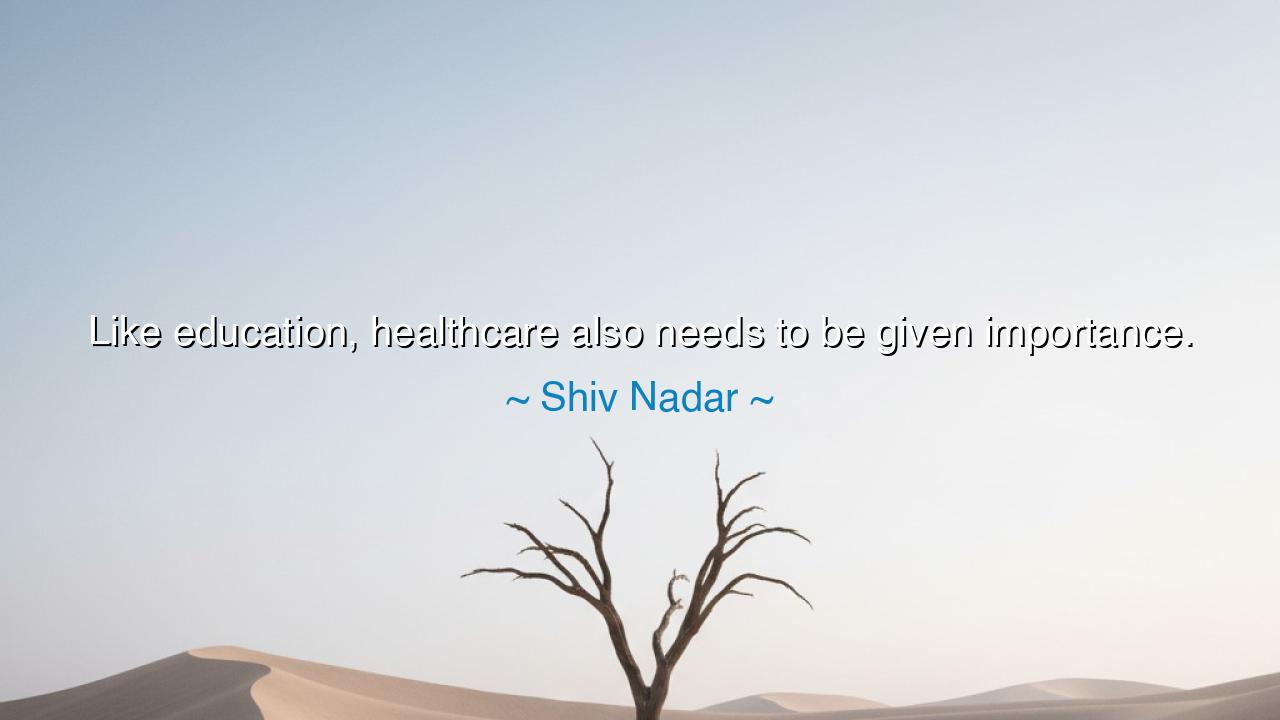
Like education, healthcare also needs to be given importance.






The words of Shiv Nadar, “Like education, healthcare also needs to be given importance,” are simple in form yet profound in truth. They arise from the deep well of human responsibility — a reminder that the two pillars of civilization, knowledge and health, are inseparable. Without education, the mind cannot grow; without health, the body cannot endure. Together, they form the foundation upon which a just and prosperous society is built. Nadar, a visionary entrepreneur and philanthropist of India, spoke these words not from theory, but from a life devoted to empowering others. He understood that progress without compassion, advancement without well-being, is an illusion.
To understand his meaning, one must see beyond the surface. Education is the nourishment of the mind, while healthcare is the nourishment of the body. One enlightens, the other sustains. A nation that invests in schools but neglects its hospitals builds a palace upon sand; the first storm of illness will wash away its promise. Likewise, a nation that heals the body but starves the intellect merely prolongs existence without giving it purpose. Nadar’s words remind us that true development is wholeness — the harmony of knowledge and health, intellect and vitality, wisdom and compassion.
The origin of this quote lies in the modern struggle of societies racing toward progress yet stumbling over imbalance. In India and across the world, Nadar saw the rise of industries, the spread of technology, and the growth of wealth — yet behind the glitter, millions suffered from poor access to education and healthcare. He saw that to create lasting change, one must educate the mind and heal the body together. His foundation, dedicated to both causes, stands as living proof that he practiced what he preached. For him, philanthropy was not charity, but duty — a sacred obligation to the generations that follow.
In the spirit of the ancients, this truth has been known across ages. The philosopher-kings of old, from Ashoka of India to Marcus Aurelius of Rome, recognized that the well-being of a people depends on both learning and living well. When Ashoka built hospitals alongside schools, he knew that knowledge without health is like a lamp without oil — brilliant for a moment, then gone. The same wisdom flows through Nadar’s words: that the health of the mind and the health of the body are one river with two currents. When either dries, humanity falters.
Consider the story of Florence Nightingale, the lady of the lamp. Her work during the Crimean War not only saved the wounded but illuminated the path to modern public health. She was not a doctor, but an educated woman who understood that disease and ignorance are twin shadows that feed upon each other. Her legacy stands as a testament to Nadar’s belief: education gives us the knowledge to heal, and healthcare gives us the strength to apply it. Both are acts of service; both are expressions of love.
The emotional force of Nadar’s message lies in its compassion. He speaks not only to governments but to the conscience of every person. When a child is denied schooling, a future is dimmed. When a mother cannot afford medicine, a generation suffers. To give importance to education and healthcare is to recognize that every human life holds divine worth — that to lift another out of ignorance or illness is to participate in the sacred act of creation itself. The heart of civilization beats in the classroom and the clinic, where minds awaken and bodies mend.
Let this then be the lesson: invest not only in progress, but in humanity. Support schools, for they are the gardens of the mind. Support hospitals, for they are the sanctuaries of the soul. Teach the young, but also heal the sick; for what good is a wise man if he is too weak to serve, or a strong man if he knows not what is right? The balance of these two forces — learning and health — is the measure of a people’s greatness.
And remember, as Nadar teaches, that education and healthcare are not privileges but responsibilities. Every act that spreads knowledge or relieves suffering strengthens the fabric of society. When the mind is enlightened and the body is cared for, a civilization stands tall — resilient in hardship, radiant in hope. For the greatest nations are not those that conquer others, but those that nurture their own — through wisdom, through compassion, and through the sacred unity of education and health.






AAdministratorAdministrator
Welcome, honored guests. Please leave a comment, we will respond soon